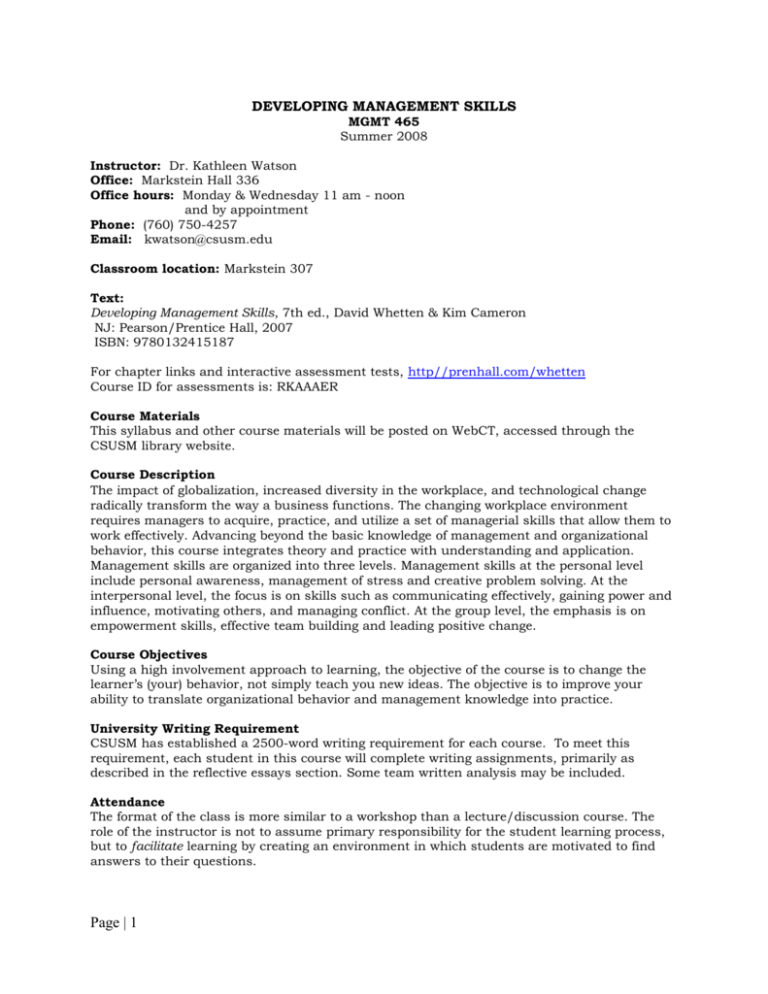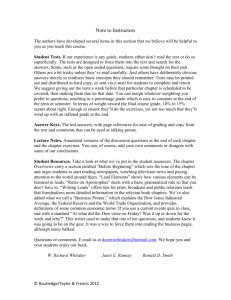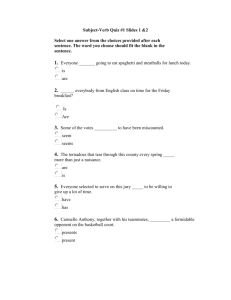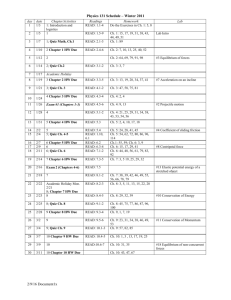
DEVELOPING MANAGEMENT SKILLS
MGMT 465
Summer 2008
Instructor: Dr. Kathleen Watson
Office: Markstein Hall 336
Office hours: Monday & Wednesday 11 am - noon
and by appointment
Phone: (760) 750-4257
Email: kwatson@csusm.edu
Classroom location: Markstein 307
Text:
Developing Management Skills, 7th ed., David Whetten & Kim Cameron
NJ: Pearson/Prentice Hall, 2007
ISBN: 9780132415187
For chapter links and interactive assessment tests, http//prenhall.com/whetten
Course ID for assessments is: RKAAAER
Course Materials
This syllabus and other course materials will be posted on WebCT, accessed through the
CSUSM library website.
Course Description
The impact of globalization, increased diversity in the workplace, and technological change
radically transform the way a business functions. The changing workplace environment
requires managers to acquire, practice, and utilize a set of managerial skills that allow them to
work effectively. Advancing beyond the basic knowledge of management and organizational
behavior, this course integrates theory and practice with understanding and application.
Management skills are organized into three levels. Management skills at the personal level
include personal awareness, management of stress and creative problem solving. At the
interpersonal level, the focus is on skills such as communicating effectively, gaining power and
influence, motivating others, and managing conflict. At the group level, the emphasis is on
empowerment skills, effective team building and leading positive change.
Course Objectives
Using a high involvement approach to learning, the objective of the course is to change the
learner’s (your) behavior, not simply teach you new ideas. The objective is to improve your
ability to translate organizational behavior and management knowledge into practice.
University Writing Requirement
CSUSM has established a 2500-word writing requirement for each course. To meet this
requirement, each student in this course will complete writing assignments, primarily as
described in the reflective essays section. Some team written analysis may be included.
Attendance
The format of the class is more similar to a workshop than a lecture/discussion course. The
role of the instructor is not to assume primary responsibility for the student learning process,
but to facilitate learning by creating an environment in which students are motivated to find
answers to their questions.
Page | 1
The format of the class will involve a combination of skills assessments, cases, role-plays,
group presentations, videos, class discussion, and experiential exercises. It is critical that
students are prepared for class and have completed the reading in advance of the class
meeting. In order to “add value” you must be prepared. Simply "getting the notes" from
someone is NOT equivalent to participating in class discussion and exercises. The diversity of
class activities requires you to arrive on time; late arrivals disturb the flow of class discussion
and disrupt in-class exercises.
Attendance is a necessary but NOT sufficient condition to obtain a high participation score. In
addition, you must “add value” to our class discussions. There are numerous ways to
contribute to class: (1) providing summaries of previous comments, (2) making observations
that integrate concepts and discussions, (3) being prepared for, and contributing to discussions
in small group formats, (4) citing relevant personal examples, (5) asking key questions that lead
to revealing discussions, (6) engaging in devil’s advocacy, and (7) disagreeing with the
instructor, so that the difference of opinion serves as both counterpoint and a basis for
exploring all sides of a concept, issue or practice.
Participation will be evaluated based on your demonstrated willingness to get involved in class
discussions, role plays and small group exercises. You should demonstrate effort to establish a
supportive learning environment for other students by providing feedback. And you should
demonstrate effort to improve your personal managerial skills.
Statement on Academic Honesty
The maintenance of academic integrity and quality education is the responsibility of each
student within CSUSM and the CSU system. Cheating and plagiarism in connection with an
academic program at a campus is listed as an offense for which a student may be expelled,
suspended, put on probation, or given a less severe disciplinary sanction. Please see the online
version for more details at: http://lynx.csusm.edu/policies/policy_online.asp?ID=25
Laptop Usage in Class
The classroom is designed for computer access to course related materials. At other times, the
computers will be lowered into the desks to facilitate group activities. Laptop use will not be
allowed during class. Use of the computer for non-course related purposes during class time is
considered a distraction from participation, and the student will be asked to leave the
classroom.
Course Evaluation
Quizzes
Ten quizzes will be given over the semester, one quiz for each chapter. The quiz
will be given after activities and discussion related to the chapter have been
covered in class. However, to derive meaning from the activities and discussion,
the chapter material must be read before the class session. This assures that
the students are prepared to use the text material to analyze cases and
participate in exercises during the day the topic is assigned. The quizzes will
have a multiple-choice format, are worth 30 points (15 questions @ 2 points)
each for a total of 300 points.
After the completion of each quiz, the students will retake the quiz in small
groups. The purpose of the group quiz is to allow the student to articulate their
rationale for their answer and persuade others of its validity. All members of the
group will receive the same score. Each group quiz is worth 15 points for a total
of 150 points.
Page | 2
Self-Assessment
Exercises
Self-Assessment exercises are an essential part of the course and are required.
The link to the assessments is at http//prenhall.com/whetten and an access
code is provided from the publisher when you purchase the text. It is required
that you do all assessments online as they will be compiled at the publisher’s
website and mean scores for the class will be computed for comparison
purposes. The classroom is equipped with computers, and there will be time
during the class period to complete the assessments. For each assessment that
is not completed, 5 points will be deducted.
Action Exams
The two examinations, given at approximately the mid-term and final class
meeting weeks are termed action exams. In order to test if skills have actually
been learned, the learner must be given an opportunity to show they can apply
learning to behavior in a live situation.
Action exams are conducted in a 30 minute team interview with the instructor.
In the exam a specific team member is presented with a situation. For each
situation the student is asked to respond in a certain way, drawing on specific
skills learned in the course. For example, a situation may describe a friend
coming to you with a problem, and you might be asked to role play a supportive
listening response (using skills learned in Chapter 4). Following your response
you will be asked to explain your response. If a student is having trouble
responding, other team members may coach them. The exam is scored live by
the instructor, based on criteria drawn from the chapters studied. Feedback
about how well you performed, and how well your team performed, is given
immediately following the exam.
In order to prepare students for the action exam, we will conduct “mock” exams
in class prior to the first exam week. Volunteers from the class will take a
sample exam question in the presence of the group. During the mock exam
others in the class are encouraged to coach the exam taker. We will then discuss
the components that result in an effective response. Each action exam is worth
100 individual points, and 25 team points.
Reflection Essays
Following in-class activities, the student will be asked to reflect on how the
behavioral activity relates to the theory from the text. Specific questions will be
accessed on WebCT as assignments, and will be graded on your ability to reflect
on behaviors that occurred during the exercise, and how the text material
relates to those behaviors.
Participation
A maximum of 100 additional points will be based on student participation; 50
points as assessed by the instructor and 50 points as assessed by your fellow
group members.
Total points
Total points in the course will be influenced by the number of reflection essays
required. It is expected that most reflection essays will be worth 20 or 25 points
each. Combined points will include 300 individual quiz points, 150 team quiz
points, 200 individual action exam points, 50 team action exam points,
reflection essay points, and any points deducted for self-assessments not
completed. It is expected that 90% of the points must be earned for a grade of A,
80% for a B, etc. Plus and minus grades will also be given within those ranges.
Page | 3
Date
Mon: June 2
Wed: June 4
Fri: June 6
Mon: June 9
Wed: June 11
Fri: June 13
Mon: June 16
Wed: June 18
Fri: June 20
Mon: June 23
Wed June 25
Fri: June 27
Mon: June 30
Wed: July 2
Page | 4
Topics Covered
Introduction to the course
PAMS assessment, quiz and activity team
formation, ice-breaker exercises, video, selfreflection
Developing Self-Awareness
Self-assessments, values and ethics, emotional
intelligence, learning style, orientation toward
change, case analysis
Managing Personal Stress
Self-assessments, elements of stress, managing
stress, time management, type A personality,
sources of stress, resiliency
Solving Problems Creatively
Self-Assessments, analytical versus creative
problem-solving, conceptual blocks, enhancing
creativity, fostering innovation
Supportive Communication
Self-assessments, supportive relationships,
defensiveness and disconfirmation, active listening,
personal management interviews
Gaining Power and Influence
Self-assessments, building personal and position
power, transforming power into influence, using
influence, neutralizing inappropriate influence
attempts
Action Exam
Motivating Others
Self-assessments, motivation and performance,
diagnosing work performance problems, enhance
individual abilities, fostering a motivating
environment
Managing Conflict
Self-assessments, diagnosing types of interpersonal
conflict, conflict management approaches, conflict
and collaboration
Empowering and Delegating
Self-assessments, empowering others, empowering
yourself, inhibitors to empowerment, effective
delegation
Effective Teams and Teamwork
Self-assessments, developing team effectiveness,
high performing teams, facilitate team leadership,
foster team membership
Leading Positive Change
Self-assessments, creating positive deviance,
developing the capability to lead positive change,
mobilizing others to change
Evaluating What We’ve Learned
Action Exam
Chapter and Quiz
Introduction
Chapter 1
Quiz 1
Chapter 2
Quiz 2
Chapter 3
Quiz 3
Chapter 4
Quiz 4
Chapter 5
Quiz 5
Chapter 6
Quiz 6
Chapter 7
Quiz 7
Chapter 8
Quiz 8
Chapter 9
Quiz 9
Chapter 10
Quiz 10







